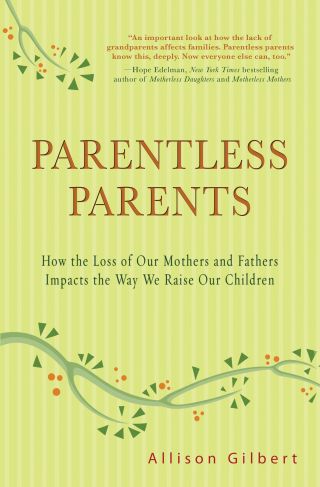Persuasion
Filling the Holes Left by Absent Grandparents
A grandparent’s influence is more pronounced than you may think.
Posted March 11, 2014

My mother died several decades ago and her absence is particularly noticed in reference to my son. Their personalities are strikingly similar although he never met her. Like so many women today, I gave birth to my son later in life. Millions of women will bear children who will have fewer years—or none—getting to know their grandparents. And their parents will be parentless, leaving gaping holes way beyond the ones in their hearts.
Grandparents have an enormous impact on their grandchildren, a fact Allison Gilbert explores in her book, Parentless Parents: How the Loss of Our Mothers and Fathers Impacts the Way We Raise Our Children.
My first grandparent died when I was in high school. From him I learned how to pack more into a shipping box or car truck than most can—skills my brother and I still use. My last grandparent died at age 100 and from her I had extensive tutelage in many things—from baking tricks to gardening tips. She shaped much of my leisure time and the pleasure I derive from it.
The Importance of Grandparents
The research supports my own and most likely your personal experience with grandparents. In a free association study of preschoolers the researchers concluded, “…at a younger age, the figure of grandparent is particularly rich in significance and connotation, almost reaching the parental figure."
Polish researchers asked high school students to write essays about their grandparents. The key finding: Grandparents are significant in cultural influence, skill development and providing friendship. Grandparents, it turns out, are a sounding board for older children at the same time they directly influence imagination, practical skills, and pass on family stories.
Several studies including an article in the Journal of Family Psychology “found that children have better social skills and fewer behavior problems if they spend time with their grandparents.”
So, where does that leave the millions of parents who have no parents and whose children have no grandparents or have them for only a short time? I asked Allison Gilbert to tell me how parents can fill that void.
Q: You mentioned telling stories often falls flat and children can’t make a connection. Why don’t children necessarily relate to stories about their grandparents?

Q: You mentioned telling stories often falls flat and children can’t make a connection. Why don’t children necessarily relate to stories about their grandparents?
A: Take a look back to when you were a child. Did stories about your grandparents always interest you? Too often, children tune out because we haven’t taken the time to convey information in a compelling way. Children are egocentric by nature. We have to remember that so lessons about grandparents have a better chance of sticking.
Q: You say ensuring children have a connection to their grandparents requires time and creativity beyond story telling. What can parentless parents do to secure the connection?
A: I love any idea that parents can make a grandparent a bit more real. My children never met my mother, so I found it was difficult for them to grasp who she was and what made her so special. I would show them photographs and when the opportunity seemed right, I’d drop her into conversations. But these efforts largely felt forced and insufficient.
I decided I needed to be proactive and create memory-making opportunities: I got permission to take my children to my mother’s office. They were able to see first hand where their grandmother worked and hear fun and colorful stories about her from someone other than me—her coworkers! And because children tend to learn best by doing, the entire experience was far more memorable than any story I could have shared over the dinner table.
The dinner table, by the way, is an invaluable tool. Many families have cherished recipes—Grandma’s Famous Apple Pie; Grandpa’s Incredible Chicken Parmesan—and while it’s great for kids to hear the names of these dishes and eat them, what I have found far more impactful is to involve kids in the meal or dessert’s entire preparation. Write down the ingredients together; take them grocery shopping; and for young children, provide a child-safe knife so they can slice and dice next to you. By involving children this way, you’ve created entertaining and largely imperceptible opportunities for sharing stories.
Q: I was intrigued by the idea of turning objects into jewelry—for example, a grandmother’s lone earring into a necklace. What are a few other suggestions?
A: Even though I devote an entire chapter to creative ideas for keeping the memory of parents alive, I continue to find inspiration everywhere. I particularly like the idea of buying packets of Forget Me Not seeds. Parents and children can plant them in a backyard garden or use a decorative pot inside their house or apartment. The benefit of doing this activity together is that it surreptitiously creates time and space for discussing your parents—the grandparents your kids are at risk of forgetting or may have never known.
Q: You’ve planned an unusual trip for parentless parents this summer.
A: I am partnering with Hope Edelman, author of Motherless Daughters, to lead an international delegation of motherless daughters and parentless parents to Peru. We are partnering with the organization Trekking for Kids and volunteering in an orphanage in Cuzco. Women will be coming together from all over the country to reinvent and reimagine their lives. Most are mothers, all are middle-aged, and many have little to no experience hiking, climbing, or trekking. What we all have in common is desire to meet the physical challenge (and elation!) of climbing Machu Picchu together and to turn our losses into an opportunity for service. To find out more, visit: Trekking for Kids.
Resources
Attar-Schwartz , Shalhevet et al. “Grandparenting and Adolescent Adjustment in Two-Parent Biological, Lone-Parent, and Step-Families.” Journal of Family Psychology Vol. 23, No. 1, (2009) 67–75. Apa.org.
Smith, Peter K. Ed. The Psychology of Grandparenthood: An International Perspective. London and New York: Routledge, (1991), pp. 9-10; 143-156 [preschoolers]; pp.50-67 [adolescents and young adults in Poland].
· Follow Susan Newman on Twitter and Facebook
· Sign up for Dr. Newman's monthly Family Life Alert Newsletter
· Visit Susan's website: www.susannewmanphd.com
· See Susan’s latest book: The Case for the Only Child: Your Essential Guide
Copyright @ 2014 Susan Newman
Photo credit: <ahref="http://www.flickr.com/photos/chiotsrun/4456597153/">Chiot's Run</a> via <a href="https://www.psychologytoday.com/%3Ca%20href%3D"http://photopin.com/">http://photopin.com">photopin</a> <a href="https://www.psychologytoday.com/%3Ca%20href%3D"http://creativecommons.org/licenses/by-nc/2.0/">http://creativecommons.org/licenses/by-nc/2.0/">cc</a>




